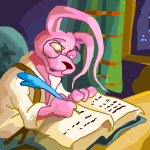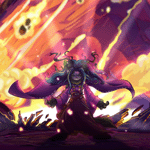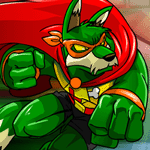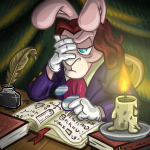 You've Mastered the Basics--Now What? Part 2
by cosmicfire918
--------
Welcome back to my guide for intermediate-level Neopian Times story writers! In part 1, we discussed why it’s important to plan ahead, as well as a big ol’ stack of guidelines for getting your prose to read right. Now that we’ve got the technicalities down, let’s start talking about story.The law of setup and payoff One of the fundamental tenets of a cohesive, emotionally satisfying story is the law of setup and payoff. It states: Don’t set up for something that doesn’t pay off, and don’t reveal a payoff for something you haven’t adequately set up. What it means is, plot twists and other events that significantly impact/alter the plot are great—but you can’t suddenly introduce something drastic that doesn’t tie in with the story at any other point beforehand, and you can’t act like you’re building up to something that never happens. For example, if the villain of your story ends up reforming, it makes much more sense from a character development perspective if you hint beforehand that she is capable of questioning her villainous motives. And if your sorcerer character spends a lot of time preparing for a magic tournament, it stands to reason that the tournament will play into the plot later to some degree. As an example from some of my own writing, in my series “Worth Fighting For”, at the end, the Space Faerie makes an appearance and ends up saving the life of one of the main characters. This is probably a little bit of a deus ex machina, but I feel that it works because the Space Faerie was discussed at various points earlier in the story, so the reader already has the idea that she’s out there looking out for Neopets. And in my series “Return to Lynwood”, one of the main characters spends the first half of the story bemoaning his lack of a magical implement, explaining the various ways in which it would make his life more convenient, and describing how his search for one has been frustrated up to this point. Thus, it feels satisfying when he finally does find the perfect implement, and the reader sees that that aspect of his character was not just something I threw into the first half to pad out the word count.  Pacing We all want to write exciting, interesting stories that will grab our readers’ attention and their emotions. But sometimes this can be taken too far—and when your story is nonstop action and suspense, a curious thing starts to happen. It begins to be… dull. Why is that? You’ve got a bunch of fight scenes and explosions and plot twists, and everybody knows those are exciting, right? The problem is in the pacing. Anything can become monotonous, even excitement. Think of it like music—a piece of music does not consist of a single note played continuously. The pauses in between the beats are what give form to the beats. Likewise with narrative. Periods of relative calm are needed to punctuate moments of action or high emotion. Otherwise, drama will become your story’s baseline, and that’s bad when you want your reader to feel impacted by drama, not think of it as par for the course. Not to mention, more intense scenes can be emotionally draining. Most readers need to take a breather between each battle or shocking revelation, or else it will pile up and overwhelm them like a roller coaster that won’t let them off.  Clichés, tropes, and archetypes—and why you shouldn’t worry about them Much has been said about the phenomenon of repeating plot elements in storytelling. The plot points of the classical hero’s journey are as old as the oldest written words we have, and yet they still echo in modern films and literature, the same structure and character development in different costumes and settings. It is because of this that many plot elements have come to be recognisable and anticipated to an audience. Of course the hero rescues a girl. Of course his wise old mentor figure does not survive to see the end of the story. Of course the villain is soundly defeated because he is the personification of evil and thus there is no other point to his life—or, if he is reformed, he meets his demise shortly thereafter because again, no point to his life when he’s not being the villain, am I right? These and others are ideas that have been used to the point of overuse, and thus we call them “clichés”. In recent years, people have started noting every recurring plot element they can find in a story, and gathering them together to categorise the similarities—these are referred to as “tropes”. And if you want to sound like a literary critic, you call them “archetypes”. You’ve probably read in other writing guides to try to avoid clichés as much as possible. But you’ve probably also read in other guides that “there are no new ideas”. If you add those two together, you realise that everything you ever write is going to be a cliché, a trope, or an archetype. Your hero defeats the villain? That’s a trope. Want to reform the villain instead? That’s another trope. Okay, but what if you reform the villain and then he not only survives but becomes a protagonist in the sequel? There’s a trope for that, too. Well, how about if the villain is a— Trope! What if he goes to— Trope! “But all of these writing guides are telling me to avoid clichés! Arrrrggghhh!” What’s a writer supposed to do at this point except throw up their hands and wail to the skies? Actually, there is something else you can do. You can ignore all this business about clichés, tropes, and archetypes, and just write what you like. It’s probably true that there are no new ideas. But to me, that’s a rather stifling, why-should-I-even-bother way of looking at it. What is also true is that there are a lot of ideas that never get old. Stories about good triumphing over evil, about people discovering who they really are, and about the power of friendship and family resonate just as well with readers today as they did thousands of years ago. They are the sorts of stories we naturally come up with. They have meaning to us. Stories are an outpouring of an author’s soul, so don’t be dismayed if someone criticises your story for being “cliché”. Often, it’s not so much the plot elements themselves that are the problem—it’s just that you may be presenting them in a less effective way than you could be. Maybe you need to flesh out your characters more so that they’re not just one-dimensional copies of stock archetypes (the arbitrarily male hero, the comical sidekick, the elderly mentor, etc.). Maybe you need to put more into your worldbuilding so that the setting comes alive in a more interesting way. Maybe a whole new vista of fascinating plot possibilities would open up if the hero didn’t rescue the girl and she ended up befriending and reforming the villain, putting a peaceful end to hostilities between their two nations. But sitting there, agonising over the idea that your story may be cliché, wondering how many tropes you’ve accumulated, is utterly un-helpful. Just sweep all of that away and write, and enjoy it. You will tell the story you want to tell, and it will be original because it comes from you.  Avoiding “has this been written about before” syndrome While we’re on the subject of originality: often it’s tempting, when you get a new story idea, to want to go back through past issues of the Neopian Times to see if anyone has ever gotten anything similar published. But I think this isn’t really worth your while, for a number of reasons. First off, it’s time-consuming. There are currently over 700 issues of the Neopian Times, not counting those sixty-odd prehistoric issues from back before Faeries had faces (well, technically fourty-odd, since none of them before Issue 23 were archived). And a new issue comes out every week. That adds up extremely quickly. That, and the Times’s very rudimentary search engine, means that it’s very difficult to do an effective search for, say, stories about pupils at the Mystery Island Training School. Plus, even if you do find stories similar to yours so you can start comparing, you may find yourself developing a bit of an inferiority complex. “These awesome authors already wrote so many cool stories about the Mystery Island Training School—how can mine ever hope to stack up to theirs? They already did it so much better! Maybe I shouldn’t even bother…” What a sad end to a great story idea that would be! Something else to take into consideration is that you will unavoidably be influenced by what other authors had to say about their subject matter. It’s just a fact of how the human mind works. In real life, authors who write for franchises usually cannot read fan-written stories because they run the risk of compromising their own ideas and being accused of plagiarising someone’s fan fiction. That is not to say that you should never, ever read anyone else’s Neopets stories. But don’t read them to try to figure out how different your idea is from theirs. You’ll just end up altering your ideas to try to not resemble someone else’s, instead of writing what you want to write. Finally, just because someone’s written about something in the past doesn’t mean it can’t ever be done again. As I mentioned before, the Neopian Times archives are enormous, and new people join Neopets all the time. They won’t be familiar with older NT issues, and they won’t know or care if someone back in issue 161 also made up a conspiracy theory about Brightvale secretly being evil. And everyone has different ideas about the same thing. It’s part of what makes human creativity so interesting. Nobody will write about something in the exact same way as anyone else, and I think one of the most fun parts of the Neopian Times is seeing various interpretations of the Neopian setting and lore. I know of at least three different writers who have written about the cast of the Meridell plots, and they each have different ideas for the characters’ personalities and further adventures. They’re also all awesome ideas and fun reads, so it doesn’t matter to me that they’re revisiting the same material as each other. For an example a bit closer to home, there is another Times author, ayame_23, who also enjoys writing about Werelupes and a Werelupe King. But there is where our creative inspiration diverges, because she has created a plotline and a cast totally different from my own, but that I think is extremely well-written and engaging. I love her work, and I don’t worry one bit about how much mine may or may not resemble hers. We’ve each got our own stories to tell. Again, don’t worry about originality, and just write.  Do your research! I might sound pedantic, but the fact of the matter is that a well-researched story shows more polish and cohesion than a story cobbled together with guesswork and fudging. It really does make a difference knowing how long ago the first Meridell plot took place, what species the Illustrious Armoury shopkeeper is, and what a mutant Cyodrake looks like. It gives your story a more solid connection to Neopia—and it also shows how much you care about your source material. Thankfully, researching aspects of Neopia is rather easy. Browsing the site itself will give you plenty of information, and Jellyneo’s Book of Ages and Item Database are indispensable for virtually anything you might need to know about any Neopian character, plot, world, or item. So I think there’s really no excuse not to do your research. Not to mention, it’s quite fun! (Well, I think it’s fun.) I think this is a good point at which to stop for the week. Please join me next week for part 3, where I’ll wrap up my discussion on story construction, and throw in a few more important tips about the writing process itself!
|